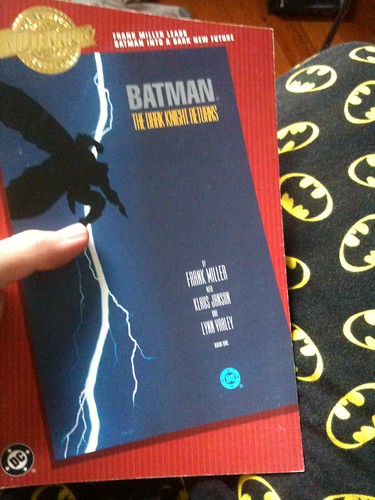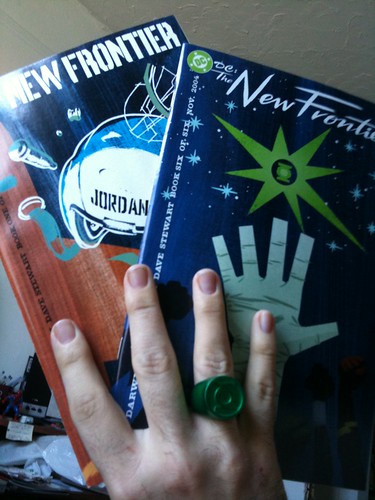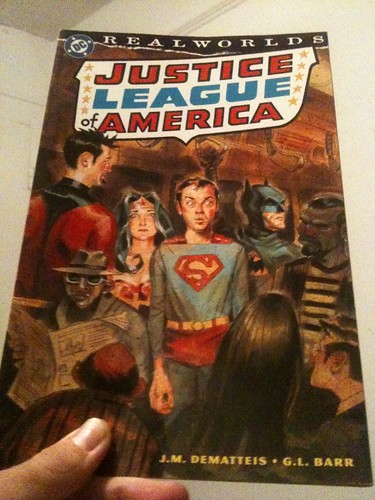The truth is that this is far from the first time these characters have been reinvented. (1986's "Crisis on Infinite Earths", most notably.) The highest-profile retro-fitting maybe. Mentioned in newspapers. Advertised on TV. But still.
, these long-running pop culture characters have to be treated like rubber bands. Stretch! Stretch who these characters can be! Make Ray Palmer, the superheroic, super-shrinking Atom, a widower to a crazy serial killer. (That was done back in 2oo5 in the near-universally-revered mini-series "Identity Crisis".) Make Batman and Superman aging neo-fascists. (Frank Miller seemed to have no fear in pushing that concept in his works "The Dark Knight Returns" and "The Dark Knight Strikes Again".) Place Superman's famous crash-landing in the corn fields of the USSR instead of the US circa 1938. ("Red Son", Mark Millar's alternate take on the DC mythos is also a popular one.)
And so on...

I finished reading all the non-continuity Elseworlds stuff sitting around my house from Frank Miller's goddamn Batman to J.M. DeMatteis' Realworlds TV producer Batman to Warren Ellis' interpretation of Adam West's Batman to Brian Azzarello's First Wave Batman to the kiddie Batman from "Batman: Brave and the Bold".
Then I moved onto the origins of these fantastic characters: "Batman: Year One", "Superman For All Seasons", "Superman: Earth One" (which
I reviewed when it came out last year), "Superman: Secret Origin", "DC: The New Frontier".
I followed this with two issues of "Justice League of America" circa late 1973 I've had sitting around for a very long time. #107 and #108, which make-up "Crisis on Earth-X!" specifically. And I chose to finish in entirely unfamiliar territory: a copy of Jack Kirby's "OMAC" #6.
The result? A whole mess of Batmen, actually. I realized that my first childhood favorite was still my favorite among the DC pantheon and the amount of his appearances among my reading material from the company belied this.
But in that, I discovered something about all these different interpretations of the character: they are all completely different but they all have something in common. Something that makes them all still qualify as Batman.
From Warren Ellis' original pitch for the one-shot "Planetary/Batman: Night on Earth":
"The Batman sees how to end it -- and tells Blank how to see the world. What worked for him when he's teetered on the edge. How to perceive the world." Batman, the man who "tries to make the world make sense by thinking about it..." (Batman/Planetary Deluxe Edition, p. 50)
From the script to the same:
"[Elijah] SNOW; YOU'RE NOT A COP ARE YOU?
SNOW; I DON'T THINK VIGILANTE IS THE RIGHT WORD, EITHER.
...
BATMAN; DO YOU REMEMBER YOUR PARENTS?
BLACK; YES.
...
BATMAN; DO YOU REMEMBER TIMES WHEN THEY MADE YOU FEEL SAFE?
BLACK; YES.
...
BATMAN; THAT'S WHAT YOU HOLD ON TO.
BATMAN; THAT'S WHAT YOU CAN DO FOR OTHER PEOPLE.
BATMAN; YOU CAN GIVE THEM SAFETY. YOU CAN SHOW THEM THEY'RE NOT ALONE.
PAGE FORTY-SIX
Pic 1;
A half-page portrait of the Batman, head and shoulders -- THIS is the reason he does what he does. This is the lost core of the man.
BATMAN; THAT'S HOW YOU MAKE THE WORLD MAKE SENSE.
BATMAN; AND IF YOU CAN DO THAT --
BATMAN; -- YOU CAN STOP THE WORLD FROM MAKING MORE PEOPLE LIKE US." (Batman/Planetary Deluxe Edition, pgs. 91-94)
This got my wheels spinning... Batman changes his point-of-view through sheer willpower and that altered POV is absolutely required to do "what he does"? If Warren Ellis (@warrenellis) says it, it must be true!
Same sentiment said faster, perhaps, by Brian Azzarello (@brianazzarello) in "Batman/Doc Savage: Bronze Night" one-shot:
"I know I can make the world better. ... Hell, from before I could think for myself, that's all I thought to do." (Batman/Doc Savage Special, pgs. 4-5)
In "The Dark Knight Strikes Again", on his return to Earth after a very long sojourn, at Batman's request, Hal Jordan the Green Lantern thinks:
"How strange that it would be you. The mean one. The cruel one. The one with the darkest soul. ... How strange that you, of all of us, would prove to be the most hopeful."
(The Dark Knight Strikes Again Deluxe Edition, p. 202)
"The Dark Knight Strikes Again" really should be titled something like "The Justice League Returns" as it's more of an ensemble piece than the name suggests.
Furthermore, a careful reading of Neil Gaiman's (@neilhimself) "Whatever Happened to the Caped Crusader?" brings us a parallel as the supposedly dead Batman speaks to his long-dead mother Martha Wayne:
"You don't get heaven, or hell. Do you know the only reward you get for being Batman? You get to be Batman." (Detective Comics #853, p. 19)
Perhaps a better selection from that work, that comes closer to the meat of the answer I want, is:
"I've learned... that it doesn't matter what the story is, some things never change.
...
The Batman doesn't compromise. I keep this city safe..." (Detective Comics #853, p. 12)
Batman is the man who makes the world a better place by altering his point of view.
But what about those other two heroes of DC's holy trinity?
Superman seems so simple on the surface that most discount him entirely. 'Superman isn't brave, he's invulnerable', I've heard people say. This is a mistake.
Superman is vulnerable in that he is too emotional, too nice. Too perfect.
Frank Miller's "The Dark Knight Strikes Again" presents Superman as a man broken by the yoke of his own fears. A superhuman so afraid of any loss of human life, he allows for a complete destruction of the quality of all life.

The sequel to "The Dark Knight" quadrology from 1986 is almost universally reviled among comics-fans. It's a tremendously dark and depressing portrayal of the DC Comics superhero characters. In the end, Superman is convinced by the daughter he has had with Wonder Woman as well as Miller's fascist Bruce Wayne that the remaining superheroes ARE categorically different, ontologically different, and unquestionably better than petty, average, normal human beings. So why NOT rule over them and force them to live better lives? Millar's Emperor Superman from his "Red Son" comes to the exact same conclusion: be the alien overlord, force the peons to be good.
In the movie "Kill Bill:Vol. 2", David Carradine gives a soliloquy on the nature of Superman in the middle of a fight scene with Uma Thurman. Quentin Tarantino very smartly cribbed from Jules Feiffer's famous essay "The Great Comic Book Heroes" when he had the character of Bill say:
"Superman didn't become Superman. Superman was born Superman. When Superman wakes up in the morning, he's Superman. His alter ego is Clark Kent. His outfit with the big red "S", that's the blanket he was wrapped in as a baby when the Kents found him. Those are his clothes. What Kent wears - the glasses, the business suit - that's the costume." ("Kill Bill: Vol. 2", 2oo4)
So:
Superman is the secret identity.
Clark Kent is the disguise.
But:
Clark Kent is the everyman.
And Superman is like no man.
Emotionally and psychologically very human but ontologically alien. Biologically Kryptonian. Somewhere in-between is the real person, Kal-El. The Superman, the Ubermench, the In-Between Man. He may not be the everyman, but he is of every person who's ever lived.
Somebody wise once wrote: Batman is a man trying to be a god, Superman is a god trying to be a man.
I think that's the truth. Just not the whole truth. They are both men and both gods, both effect change in a positive way, but from different sources of energy.
-Superman is 'good' striving forward, positively
-Batman is 'bad' striving forward, positively.
That's why Batman appeals to people who find the Superman character repulsively simple, while Superman fans rarely fail to be Batman fans also. Batman took negative energy, used it, and spun it positively. Parents murdered in front of him at an early age. So he struggles to fight so that none may have to experience what he did. Superman took positive energy and spread it exponentially. He was shown kindness by his adopted planet from day one, despite his great loss in never knowing his birth parents, his birth home. He struck out to make others feel as welcomed and safe as he was.
So then...
Is Wonder Woman just a female clone of Superman? Just more good vibrations? A god trying to be a woman? It's been suggested that as she is the enemy of Ares, and thus the enemy of War, she is the peace-maker of the DC pantheon. ("Super Heroes United!: The Complete Justice League History", Justice League: The New Frontier DVD, 2oo8) Yes, but they are all peace-makers! I think Wonder Woman might be among the clearest examples of what all mythic characters are at their core: ideas striving to be alive. Womanhood. Strength in femininity. Fortitude in the face of social-bondage.
And what of these other men and women with remarkable abilities?
The Flash has been portrayed as a man running away from his past and/or toward solutions. The Martian Manhunter feels like an old soldier brought into a new fight. Green Arrow is the superhuman social conscience. Black Canary is the superheroic working woman. Green Lantern is a bureaucratic superhero, a space-cop who has to answer to the intergalactic Guardians. The Question is the spiritual warrior.
They each serve a purpose, fill a role. All evolved from very simple to complex characters, and all have their own personal struggles. All reflect something different back at us, the reader.
I believe, now, what I've always believed: superheroes are an intrinsic part of the human psyche exploded and clarified, expanded into colorful representations of our desires, our needs, our hopes, and our dreams. DC was there first and, in some ways at least, did it best. And I suspect no re-boot, re-launch or re-imagining will change that.




